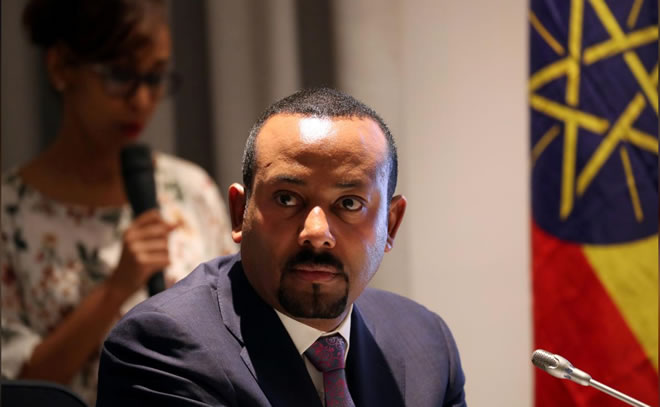
Giulia Paravicini
Sunday September 6, 2020

FILE PHOTO: Ethiopia's Prime Minister Abiy Ahmed attends a signing ceremony with European Commission President Ursula von der Leyen in Addis Ababa, Ethiopia December 7, 2019. REUTERS/Tiksa Negeri
Abiy has overseen sweeping democratic reforms since taking power in Africa’s second most populous nation two years ago. But the federal government - and major opposition parties - agreed to postpone national and regional elections due in August until the COVID-19 pandemic was under control.
Tigray, whose leaders dominated the previous administration and have often bitterly denounced Abiy, announced it would hold elections anyway.
“We know there is an open threat by Abiy to militarily intervene against Tigray and to cut funds, but we will still go ahead with the vote,” said Getachew Reda, a former federal information minister and now a spokesman for the Tigray People’s Liberation Front. “We know there will be consequences.”
Abiy has given little away about his plans. A spokeswoman for his office said in a text message that the vote would provoke “a constitutional response” and referred Reuters to parliament.
The spokesman for parliament, Ato Gebru Gebresilasie, did not return calls seeking comment, but a report by the International Crisis Group think tank warned last month that the two sides were on a “collision course” and said: “If Tigray proceeds, Abiy’s government is ready to consider any new regional administration illegitimate.”
Tigrayans are only a small minority in the Horn of Africa nation of 110 million, but dominated power since 1991, when the Ethiopian People’s Revolutionary Democratic Front drove a Marxist military dictator from power. The Front was a coalition of four ethnically-based parties, including the Tigray People’s Liberation Front.
Last year, three of the four parties in the coalition joined to create the new Prosperity Party under Abiy. The Tigrayans refused. Some said they felt persecuted - many former officials who have appeared on trial since Abiy took power are Tigrayan.
But in a dynamic playing out all over Ethiopia, the long-ruling regional party is itself facing pressure from more zealous ethnic nationalists. A new party is openly pushing Tigrayan secession from Ethiopia, a polyglot nation of more than 80 ethnic groups.
For now, that’s a fringe idea, said Dr Asnake Kefale, associate professor of political science at Addis Ababa University.
“Among the people there isn’t a will to become independent,” he said. “It’s an idea that is played with by the elites.”